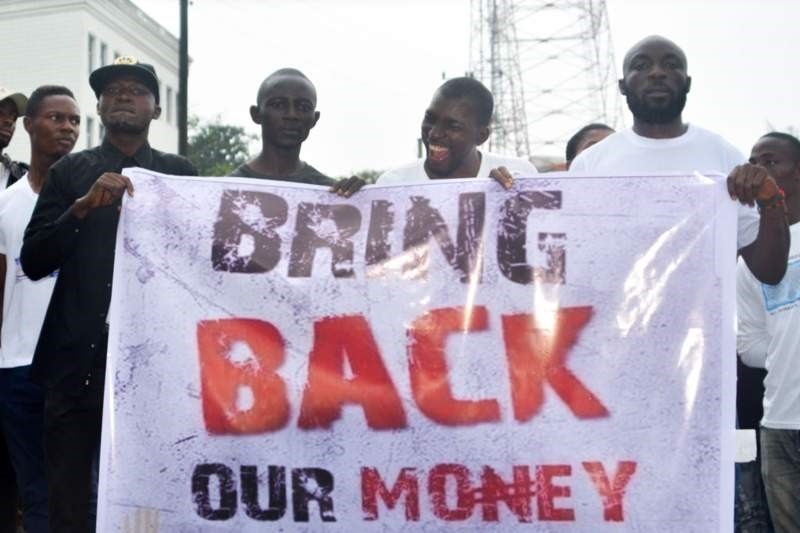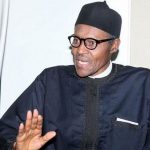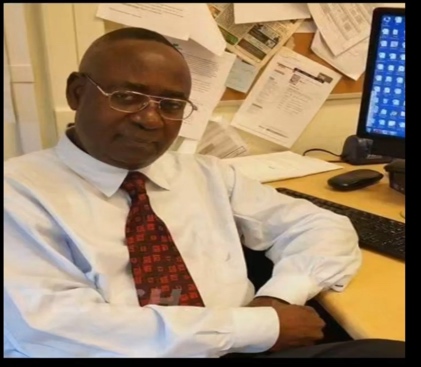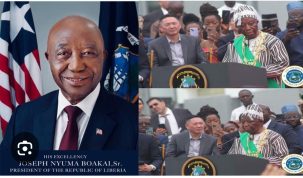The proverb that says, “The more things change, the more they stay the same” can be interpreted in several ways. One such example is, “Turbulent changes do not affect reality on a deeper level other than to cement the status quo.” However, another phrase that is often said in a resigned or sarcastic manner is, “Many things remain consistent even as changes happen.”

“The more things change, the more they stay the same” was coined by French writer, Jean-Baptiste Alphonse Karr
(1808-1890). Peter M. Senge, author of the book titled: “The Fifth Discipline – The Art and Practice of the Learning Organization” refers to it as “Reality is made up of circles but we see straight lines.”
There are several versions of this famous statement, but the one this article will focus on are the statements Liberians are fond of saying: “Old wine in new bottles” and “Repeating the same thing over and over.”
The reason why the Liberian government is a failed state is better explained by Peter M. Senge’s theory of “How to Overcome Learning Disabilities in Organization”. According to the theory:
It is no accident that most organizations learn poorly. The way they are designed and managed, the way people’s jobs are defined, and, most importantly, the way we have all been taught to think and interact (not only in organizations but more broadly) create fundamental learning disabilities. These disabilities operate despite the best efforts of bright, committed people. Often the harder they try to solve problems, the worse the results. What learning does occur takes place despite these learning disabilities – for they pervade all organizations to some degree.
Here is a five-step summary of how to overcome this mindset:
1. Systems Thinking: comprehend and address the whole and examine interrelations between parts.
2. Mental Models: deeply ingrained assumptions, images, generalizations that influence how we act. Ability to reflect in and on actions.
3. Personal Mastery: continually clarifying and deepening our personal version.
4. Shared Vision: with vision people, excel and learn not because they are told to but because they want to.
5. Team Learning: process of aligning and developing capacities of a team to create results truly desire to see.
www.qaspire.com/tag/peter-senge
You may want to know the way in which Senge’s ‘Disciplines of the Learning Organization’ can change the way the Liberian government operates. I intend to prove that had the government applied this principle, the country would not be a failed state.
Liberia is a failed state due to the fact that since the country was established it has been ruled by “finger-full” elites, who have been preoccupied with running the government as their personal property. They do so with little or no regard for the constitution, the laws of the land; abused their power by restricting freedom of the press and speech. Moreover, they, their families, friends and associates use the wealth and resources of the nation as their own, while their ruling party and its officials use and eat (steal) the country’s money with impunity. Therefore, it should not come as any surprise that in broad daylight, 16 billion dollars can go missing without any trace. It is business as usual, because it was the method of operation used during the 12 years of Ellen and her Unity Party administration. Change of government has always followed the path of “old wine in new bottles.” This has been the paradigm for change.
Loyalty of the Governor of the Central Bank of Liberia
When Nathaniel Patray was made Governor of the National Central Bank of Liberia (CBL), he told the Liberian people and the world that he was going to implement President Weah’s mandate which violates the Act that established the National Central Bank Liberia.
According to Patray:
What we’re doing in the bank right now — we are working at the President’s mandate — technical economic management team which is different from the mandate of the Central Bank that is within the bank’s act. We will work with the Bank’s Act, but if it is necessary to sideline it for a while to get the President’s own mandate accomplished, we will have to do that. So, what I am looking for and the rest of the governors is for production, we have to produce so nobody salary will be cut.
Governor Patray made this pronouncement when he officially took office. The Act creating the CBL prohibits Governors of the Bank from having affiliations which could interfere with their duties.
In keeping with the provision of The Central Bank of Liberia Act of 1999, as contained in part II section 3, "The principal objectives of the Central Bank shall be to achieve and maintain price stability in the Liberian economy. To this end, it shall devise and pursue policies designed to:
(a) Preserve the purchasing power of the national currency;
(b) promote internal and external equilibrium in the national economy, …" Section 4 of the Act indicates the functions of the bank and specifically states "The Central Bank shall have functional independence power and authority to:
(2) Administer the currency laws and regulate the supply of money …" As the CBL Act provides, I must state with emphasis that the independence of the Central Bank is a sine qua non for its effectiveness.
It is important to note that while the achievement of some of these and other goals of government will, at times, conflict with one another and involve trade-offs, policy prescriptions or pronouncements must ensure that prudent measures are taken to minimize or avoid adverse effects and at the same time ensure accomplishment of the desired goal.
To this end, while performing one of its functions of issuing legal tender banknotes, the Central Bank must take into consideration one of its principal objectives of achieving and maintaining price stability in the Liberian economy.
 Accordingly, the banknotes must be issued cautiously in relation to the availability of goods and services in order to avoid the inflationary effects and other adverse economic and financial consequences. I am inclined to believe that this has not been the case of late, and have contributed to significant deterioration in the exchange rate, higher prices of goods and services, scarcity of foreign exchange among other adverse economic consequences. This should not be allowed to continue; and corrective measures need to be taken with the political will demonstrated at the highest level to reverse this trend.
Accordingly, the banknotes must be issued cautiously in relation to the availability of goods and services in order to avoid the inflationary effects and other adverse economic and financial consequences. I am inclined to believe that this has not been the case of late, and have contributed to significant deterioration in the exchange rate, higher prices of goods and services, scarcity of foreign exchange among other adverse economic consequences. This should not be allowed to continue; and corrective measures need to be taken with the political will demonstrated at the highest level to reverse this trend.
A Wonder Shall Never End Moment
On September 17, 2018, FrontPage Africa (FPA) reported that about L$9 billion of the Liberian people’s money was allegedly missing. On the same day, the Government issued a press release, which was signed by the Justice Minister, Hon. Frank Musah Dean, Jr., confirming the speculations about the missing money which reads:
Initial findings indicate that the containers and bags of moneys allegedly arrived between November 2017, prior to the inauguration of the current government and August 2018. Evidence available to the Investigative Team has established that the current administration was not informed about the arrival of the containers and bags of money into the country.
I presume the intent of the press release is to exempt the Weah administration from having anything to do with the missing money. However, on that same day, former President Ellen Johnson Sirleaf had a special interview with FPA, during which she expressed her disappointment with the government’s findings. Strange as it appeared, it reminds of a story I wrote about Liberia’s corrupt practice. The title is: “Why Did John Johns Refuse Promotion?” This is a true story, but I used fictional names to hide the true identities of the people involved.
Why Did John Johns Refuse Promotion?
As a youth growing up in the vicinity of Clay Street & Camp Johnson Road, I honestly thought corruption was a legal practice. Why? For the most part, individuals who embezzled government funds were transferred to other positions instead of being persecuted for their crimes. These individuals were transferred or promoted as if they had contributed meaningfully to national development.
John Johns was a messenger (an expediter) in the Bureau of Customs at the Ministry of Finance. John Johns was troubled when he heard that his boss was considering him for a promotion. So he decided to prevent his boss from promoting him by bribing him.
troubled when he heard that his boss was considering him for a promotion. So he decided to prevent his boss from promoting him by bribing him.
Based on the Bureau’s records, John Johns was the most dedicated employee in the history of the Bureau. He was the only employee who worked seven days a week – the first to report to work, and the last to leave. It was due to his dedication and commitment for which he was being considered for the promotion. The promotion came with the incentive of salary increment (from $50.00 to $75.00 per month).
However, the environment in which John Johns worked had a culture of receiving “cold water” (bribe) for performing public service. In other words, it was the usual practice and it was encouraged. Anyone who refused to participate was considered stupid or naive. This was the atmosphere in which Messenger John Johns worked. John Johns’ monthly starting salary was $25.00 per month. When John Johns was first employed, he had a wife and two children. Within five years, he had five increments, which brought his salary to $50.00 per month. With this salary, he supported four children, his wife and two other children by each of his two girlfriends. With this meager salary, John Johns managed to build 4 concrete houses in less than a year.
Upon hearing the news around the office that he was slated for promotion, John Johns grew weary and troublesome. As a result, he immediately called on the close friends and associates of his boss in order to have them talk to their friend (his boss) on his behalf to change his mind regarding his promotion. He got these friends to understand his reason for refusing the promotion. One of them even said, “If a person doesn’t want to be promoted, you can’t force  him.” Based on this rationale, the friends offered to help John Johns by approaching their friend (his boss) on his behalf; and for their assistance, John Johns promised to have them rewarded handsomely. On one fine day, the friends decided to meet at the home of John’s boss, their friend whose name is Johnson. John Johns was put in charge to make arrangement with Mr. Johnson’s wife by providing her with funds for the entertainment at the occasion. John Johns gave her sufficient cash to stage the event in grand style. In order for her husband not to leave home on the day of the meeting, Mrs. Johnson made sure to tell her husband that on Saturday a few of his friends were coming over to visit him. Therefore, she said, he needed to be at home to receive and entertain his guests.
him.” Based on this rationale, the friends offered to help John Johns by approaching their friend (his boss) on his behalf; and for their assistance, John Johns promised to have them rewarded handsomely. On one fine day, the friends decided to meet at the home of John’s boss, their friend whose name is Johnson. John Johns was put in charge to make arrangement with Mr. Johnson’s wife by providing her with funds for the entertainment at the occasion. John Johns gave her sufficient cash to stage the event in grand style. In order for her husband not to leave home on the day of the meeting, Mrs. Johnson made sure to tell her husband that on Saturday a few of his friends were coming over to visit him. Therefore, she said, he needed to be at home to receive and entertain his guests.
At the appointed time, 7:30 PM sharp in the evening, they showed up at Mr. Johnson’s home. He was glad to see his friends and associates. After they exchanged greetings, Mrs. Johnson served their guests expensive drinks and delicious food. By then, Mr. Johnson began to wonder about the purpose of such an elaborate occasion. He was somewhat concerned as to how his wife obtained the resources to provide for such high-class entertainment.
Looking at the reflection on Mr. Johnson’s face, John Johns got up immediately, took the center stage, and said, “Mrs. Johnson, Madam, I thank you for assisting me in arranging this meeting.” To the friends and associates of his boss, he added, “Gentlemen, I thank all of you too, for responding to my request in a timely manner. However, before I begin to tell you our purpose for gathering at your home, let me first thank God Almighty for the good living he continues to bless me and my families (he has two), and for forgiving all of the bad, bad things I have done in the past and my life time.”
John Johns then focused his attention on his boss. He said to Mr. Johnson, “Chief, the purpose for which we gathered here has to do with rumors in the Bureau that you are thinking of promoting me. Is there any truth to what they have been saying around the office?” The boss responded in the affirmative. “It is certainly true”, said his boss. John Johns then proceeded by saying, “Chief, that is the mean reason I brought you this ‘cold water’ and ‘goat soup’ (bribe), and I brought along your close friends and associates to beg you not to promote me. Chief, in the name of the Almighty God, please reconsider your decision. And if it means for me to give you half of my salary for your personal use, I would rather do so than to be promoted. Chief, I beg you; I love my present position, very much! I do not want any increment nor to be promoted to any other position. My present position is meant for me!"
As soon as John Johns got through speaking, the Mr. Johnson thanked him for his concern and generosity, and said to him, “If that’s what you want, I have no other choice but to adhere to your wishes.” He accepted the “goat soup”, “cold  water” and part of John Johns’ salary without questioning him about his motives. After reaching this agreement, Mr. Johnson and his guests had a good time celebrating John Johns’ request not to be promoted.
water” and part of John Johns’ salary without questioning him about his motives. After reaching this agreement, Mr. Johnson and his guests had a good time celebrating John Johns’ request not to be promoted.
The so-called missing money is a continuation of Liberia’s corruption saga. Corrupt practice seems to be the order of the day. The people have gotten accustomed to corruptions. To them, corruption is a way of life. They reasoned that “since corruption cannot be eliminated, why hurt your head over it.” The common advice that they usually offer is: when the opportunity presents itself for you to take your share of the elephant meat, do so. Don’t complain when others are doing it; wait on your turn. A Liberian government job is like a big elephant’s meat; it is plenty. In fact, it belongs to anyone who can cut a bigger piece of it; because “if you steal from yourself (government) it is no sin at all.”
I am in agreement with Cllr. Frederick Jayweh that “…the Central Bank of Liberia and the GoL under Mrs. Johnson Sirleaf, should be cited along with members of the current Weah-led government to account for where the LD$16B went and who appropriated this large sum of money to him/her/themselves. So the question as to whether Ms. Sirleaf and her government happened to have been issued uncertain and indistinct orders by the 53rd Legislature of Liberia that caused them to print ‘the LD$16B is moot and immaterial as to where did the LD$16B printed and brought into Liberia go”’.
Conclusion
If we are to make measurable progress in the 21st century, there has to be a paradigm shift; the way to do it is to make use of some of Peter Senge’s approach or method in running the government.
This challenge has to be met with our collective efforts so as to bring to an end the practice that has prevented our development. And to do so, we will have to make use of what we have in common as Liberians regardless of class, religion, and ethnicity.
About The Author & Bloju TEH: 
Griot Elder Siahyonkron Jglay Kpa-kay Nyanseor, Sr. is a life-long activist (*troublemaker); a Griot and Member (2012) of Bloju Geesayfahnnonkon TARTY TEH’S Social, Political and Economic Rights Activists who is Committed and Dedicated in keeping TEH’S legacy and memory ALIVE through Writing and Telling the Stories of African people.







